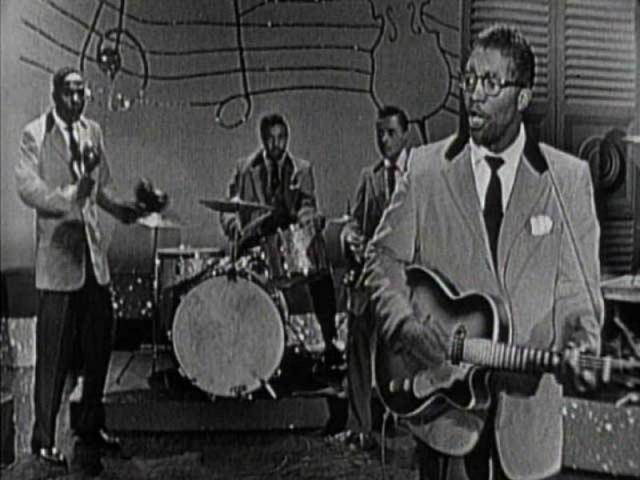
On the evening of November 20, 1955, the usual calm of Sunday night television was shattered by the electrifying strum of a square guitar. Bo Diddley stepped onto the stage of “The Ed Sullivan Show,” not just to perform but to ignite a cultural revolution. Scheduled to play Tennessee Ernie Ford’s “Sixteen Tons,” Diddley instead launched into his own eponymous track, “Bo Diddley.” It was a bold move that flouted the expectations of the conservative show host and America’s mainstream audience.
This wasn’t just an act of defiance; it was a musical declaration of independence. Diddley’s rhythm, an infectious blend of blues and what would soon evolve into rock and roll, reverberated through the living rooms of America. The “Bo Diddley beat,” with its relentless thump and jangle, was more than a catchy tune; it was the heartbeat of a burgeoning musical revolution.
Diddley’s performance that night did more than introduce a wider audience to his unique style. It challenged the established norms of the entertainment industry. In a time when television was still a fledgling medium, predominantly showcasing sanitized versions of popular music, Diddley’s raw energy and unapologetic blackness were groundbreaking. His appearance on a prime time show like Sullivan’s, which reached millions of viewers, was a significant step in bringing the authentic sound of African American music to a broader, more diverse audience.
Moreover, Diddley’s decision to play his own song was a stand for artistic integrity in an era where commercial pressures often dictated musical output. This moment of artistic rebellion resonated with a generation of musicians and fans who were hungry for something real, something that spoke to their experiences and emotions more directly than the carefully curated tunes that dominated the airwaves.
In retrospect, the significance of Bo Diddley’s performance on “The Ed Sullivan Show” transcends that single evening of television. It was a precursor to the seismic cultural shifts that the late 1950s and 1960s would bring. Diddley’s beat laid the groundwork for the explosion of rock and roll, influencing artists from Elvis Presley to The Rolling Stones. His appearance was a harbinger of the more inclusive and diverse musical landscape that would emerge in the following decades.
Today, Diddley’s legacy is undeniable. His rhythm, his sound, and his spirit continue to influence musicians across genres. That night in November 1955 wasn’t just a standout television performance; it was the moment when Bo Diddley etched his name into the annals of music history. In his own words, he “opened the door” for the rock and roll revolution. On that Sunday night on “The Ed Sullivan Show,” America got its first real taste of that revolution, to the beat of Bo Diddley’s square guitar.



Leave a Reply